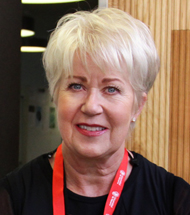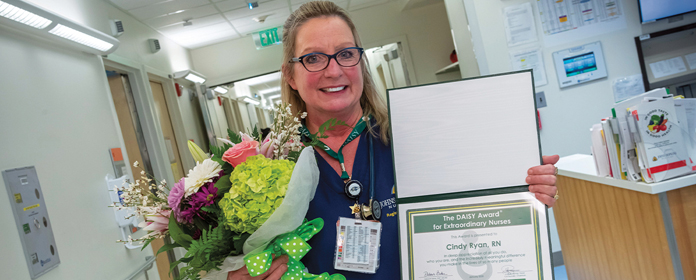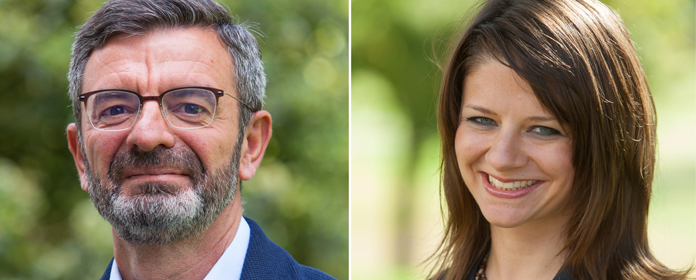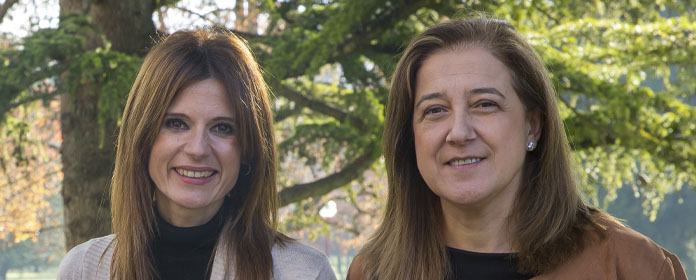"Palliative care is not about death, but about living well with an advanced disease".
Carole Robinson, visiting researcher of the ATLANTES Program of the ICS, has offered a course for healthcare professionals on meaningful conversations at the end of life.

PHOTO: Natalia Rouzaut
Talking about the last moments of life in the face of an advanced disease can be complicated for the patient, for his or her family and also for health care professionals. However, talking with the patient about what is important to him or her can be crucial during this time. "Palliative care is not about death, but about living well with an advanced disease," says Carole Robinson, professor emeritus of nursing at the University of British Columbia (Canada) and visiting researcher in the ATLANTES Program at the University of British Columbia (ICS). Institute for Culture and Society (ICS) program at the University of Navarra.
The expert has visited the University of Navarra to offer the workshop'Serious Illness Conversation' ('Tenemos que hablar')organized by the ATLANTES Program. The initiative emerged as a program developed jointly by Brigham and Women's Hospital and the Harvard T.H. Chan School of Public Health in the United States. Specifically, it offers a framework to help healthcare professionals have meaningful conversations with a patient with advanced illness.
The workshop teaches the moment to start the conversation, the steps to take over time, and even the exact words to use at each moment, as it has been outlined which ones are acceptable to patients and families.
"If we talk to the patient about what is relevant to him, we can find out what he values, which will guide the clinical internship and we can offer the best care for that person," says Robinson. For example, if a person, faced with the prospect of death, wants to spend quality time with his or her family, we can try to offer home care and not admit him or her to an Intensive Care Unit.
"These conversations explore aspects core topic about how they want to live their lives, care, and how to have quality of life with an illness," she stresses. According to the researcher, these conversations improve general communication, medical decision-making, help the family in bereavement - since they have found that "the end of life has had a meaning" - and have even been shown to reduce the patient's anxiety and depression.
Fear of speaking outThe Canadian expert regrets that currently these conversations are not frequent in most cases. This is due to several factors: the professionals' fear of increasing the patient's suffering, of taking away hope, they feel they do not have enough time, or they do not feel sufficiently prepared.
Robinson dispels some of these myths: quotation research has shown that these conversations can be combined with other tasks within the schedule workplace and that they help professionals to be more satisfied with their work, with their capabilities and in their relationship with the patient. "You get to know the patient as a person and that gives you the assurance that the care you provide is aligned with that human being," she explains.
But professionals are not the only ones afraid to talk. Patients are also reluctant to talk about the proximity of death with their loved ones, he notes. Thus, he says, they tend not to share the experience of the disease so as not to make them suffer or be a burden. This disappears when talking to a healthcare provider: "A study has shown that people who have received early palliative care with this subject of conversations have lived longer than those who have not had this care".
Robinson assures that " research is necessary to convince that our experience is consistent with palliative care and that it is a positive intervention". In this sense, he points out that all the steps and all the results of theSerious Illness Conversationare backed up by scientific research.
He admits that there has been great progress in understanding the experience of having an advanced disease and how to help sick people. However, he believes that efforts are still needed to bring the theory to internship. There is a theory about how to live well when you are dying," he says. We need to start exploring, developing and researching interventions to live well with advanced disease."





